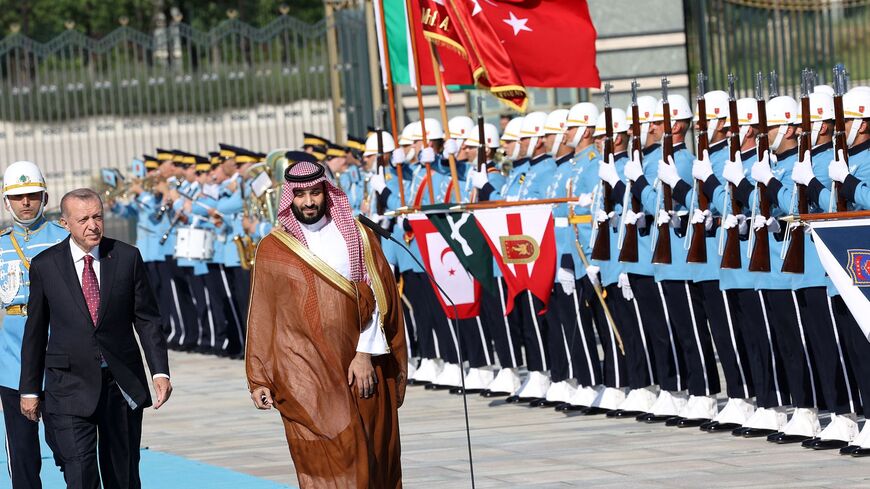ANKARA — Turkish President Recep Tayyip Erdogan's outreach to previously estranged Arab leaders, and attempts to mend fences with Western capitals whom he criticized harshly in the past, mark a significant turnaround in Turkish foreign policy following the May general elections.
Although not all of the President's followers or Islamist coalition partners are comfortable with this turnaround, many outside observers welcome the new push, while remaining skeptical over its sustainability.
Veteran diplomats and foreign policy analysts have been counseling “normalization” in Ankara’s international dealings for some time now. The attempt to “Islamize” Turkey’s foreign policy, according to them, has come at a high cost.
Erdogan’s unexpected decision to finally back Sweden’s NATO membership and his tour of Gulf states this week are the concrete products of the change he has put in motion.
But is there a sound logic behind these moves based on a coherent foreign policy vision for Turkey? Or is Erdogan merely playing for time because he is hard pressed at home?
Erdogan received a strong mandate to run the country for the next five years in the May 28 presidential elections. Nevertheless, he faces seemingly insurmountable problems at home, especially on the economic front. The devastating earthquakes in February made matters worse. Many question how he hopes to overcome these problems without major policy changes.
Erdogan is trying now to save the economy — which went into free fall largely due to his policies — with funds from abroad. That is the logic behind his visits to Saudi Arabia, Qatar and the UAE this week, according to Professor Ilter Turan of Istanbul Bilgi University
“Erdogan hopes that improved ties with these countries will see the resumption of capital inflows and help relieve Turkey’s need for hard currency,” Turan told Al-Monitor.
He cautioned, however, that “Gulf investment” usually means buying established enterprises that provide high yields rather than building new factories. “Inputs that are no more than cash transfers in return for buying existing enterprises may not result in a more productive economy” he said.
Nevertheless, Erdogan’s efforts at fence-mending with Saudi Arabia and the UAE appear to be paying off.
During and after the Arab Spring of 2011, Erdogan’s dream was to make Turkey the leading regional country once political Islam took hold of the MENA region. But existing Arab regimes maintained the regional order, which resulted in a decade of frosty ties. During this period Egypt’s Abdel Fattah al Sisi and Syria’s Basher al Assad became his principal archenemies.
Meanwhile, government circles accused the UAE of funding the failed coup attempt against Erdogan in 2016. Ties between Ankara and Riyadh also chilled after the murder of the dissident Saudi journalist Jamal Ahmad Khashoggi in Turkey.
According to Turan, that is all history now. “Support for the Muslim Brotherhood has ended and Turkey needs money which it hopes to secure from the Gulf” he said.
Erdogan was greeted warmly by Crown Prince Muhammad bin Salman in Riyadh this week. Saudi Arabia agreed, among other things, to purchase Turkish drones in what is being billed as “the biggest defense contract in Turkey's history.”
In Abu Dhabi, the last leg of Erdogan’s Gulf tour, the previously estranged sides signed deals worth $50 billion, reportedly ranging from the defense industry to reconstruction projects in regions devastated by Turkey’s earthquakes in February.
Retired Ambassador Mithat Rende said these countries are also happy to see a predominantly Sunni and militarily strong Turkey, with its vast business potential and lucrative assets. “The Gulf states are repositioning themselves too after the debacle in Yemen forced them to shift from hard power to economic diplomacy” Rende told Al-Monitor.
Ankara is also on course for improved ties with Cairo, after diplomatic relations were fully normalized recently, and work is reportedly underway for a state visit by Sisi to Turkey.
Erdogan and Assad may also meet soon, although this will take time due to differences over the repatriation of refugees and the presence of the Turkish army in northern Syria.
Turkish efforts to fully normalize ties with the US and Europe, on the other hand, appear much more difficult. On the plus side, Ankara’s prospects for getting the much needed F-16 fighter jets from the US appear to have improved following the decision to allow Sweden’s NATO membership. Turkey has also secured some promises from NATO and Sweden regarding cooperation against terrorism.
All of this has yet to happen, though.
The Turkish parliament must endorse Sweden’s NATO membership before it becomes official, and Turkish deputies are uncertain whether the US Congress will endorse the sale of F-16s to Turkey.
Prior to the NATO summit, Erdogan unexpectedly called on Europe to unblock Turkey’s EU path. It did not work as a bargaining chip over Sweden’s NATO membership, but nevertheless, Erdogan succeeded in reviving the moribund debate regarding Turkey’s EU membership.
Erdogan clearly needs better ties with the West in order to attract much-needed capital. Europe remains Turkey’s biggest business partner. Given his past track record, however many are questioning the sincerity of his outreach to the EU.
Retired Ambassador Selim Kuneralp does not expect Erdogan to introduce the necessary reforms for fully normalized ties with the EU. “He knows that raising standards pertaining to democracy, the rule of law, human rights, and so on to EU levels would undermine his political rule,” Kuneralp told Al-Monitor.
Economic analysts also argue that the current state of the rule of law in Turkey will continue to discourage Western investors. But the West needs Turkey’s cooperation over issues like Ukraine and immigration, and so its ties with the US and Europe, therefore, are expected to remain transactional.








